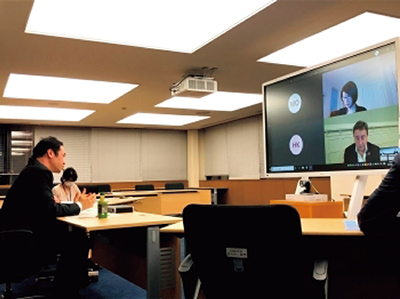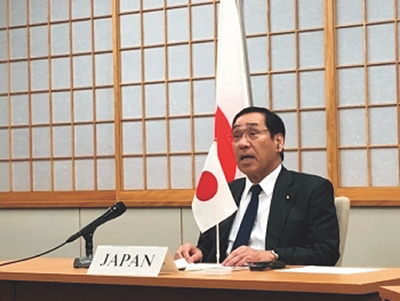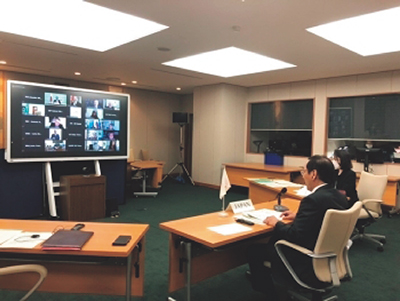(5) Partnership with Other Countries and International Organizations
A. Partnership with other countries
Japan promotes coordination with other donors on a wide range of development issues. In 2020, Japan conducted dialogues and exchanged views with the United Kingdom, Australia, the United States, the EU, and others. In addition, among these major donors, based on the commitment at the summit level, specific cooperation and collaboration are promoted in third countries in the Indo-Pacific and other regions including Africa in various fields, such as infrastructure development to strengthen connectivity, maritime security, and disaster risk reduction, and ODA is an important part of this. Furthermore, with the spread of COVID-19 in 2020, responding to issues in the field of health has become an urgent matter around the world. Addressing global development issues, including the environment and climate change, also remains important. In order to effectively utilize Japan’s ODA and work on development issues with the international community as a whole under these circumstances, cooperation and collaboration with other donors is critical, and Japan will actively promote these efforts (see also Part I for international collaboration related to the response to COVID-19).
Members of the Development Assistance Committee (DAC) of the Organisation for Economic Co-operation and Development (OECD), the so-called traditional donor countries, have been taking a leading role in carrying out development cooperation thus far. Nonetheless, emerging countries such as China, India, Indonesia, Saudi Arabia, Brazil, Turkey, and South Africa have also provided assistance for developing countries and have come to gain significant influence on the development issues in recent years. Japan, having experienced the transition from an aid recipient to an aid provider, has been striving to promote the effectiveness of emerging countries’ development cooperation to developing countries (South-South cooperation) by providing assistance to emerging countries, in collaboration with those and other countries, particularly by means of Triangular Cooperation.
Particularly in regard to China, in October 2018, the Government of Japan announced the termination of Japan’s provision of new ODA to China while also announcing that Japan and China will promote a new dimension of cooperation as equal partners. In response to this, the Japan-China International Development Cooperation Policy Consultation was held in May 2019, and there was an exchange of information concerning matters such as each country’s international development cooperation policies, organizational structure, supervision and evaluation, and experiences of cooperation with other countries and international organizations. Japan will continue to work with the international community to ensure that China’s development cooperation is transparent and consistent with international standards and initiatives.
B. Partnership for the G7 and G20 development issues
The G7 has been holding the G7 Development Ministers’ Meeting as a forum to discuss how to address various issues in the field of development. In recent years, the G7 Development Ministers’ Meeting was held in Whistler, Canada from May 31 to June 2, 2018, and the G7 Development Ministers’ Meeting and the G7 Joint Education and International Development Ministerial Meeting were held in Paris, France on July 4 and 5, 2019.
Although there was no G7 Development Ministers’ Meeting in 2020, meetings of the Development Ministers’ Contact Group on COVID-19 have been held to discuss support for developing countries from May onward, co-chaired by Canada and the United Kingdom (with the participation of Australia, the Netherlands, New Zealand, Norway, and Sweden, in addition to the G7). Representing Japan, then State Minister for Foreign Affairs Suzuki attended the meetings three times and made statements on such issues as strengthening global health systems, ensuring equitable access to vaccines, providing timely and appropriate information on food supply and demand and ensuring its distribution, and Japan’s efforts to reopen schools.
The G20 has been discussing development issues in the G20 Development Working Group, which has been held since the G20 Toronto Summit (Canada) in 2010. In 2020, under the Saudi Arabian Presidency, the G20 Development Working Group discussed the five priorities of (i) the G20 Support to COVID-19 Response and Recovery, (ii) Quality Infrastructure for Regional Connectivity, (iii) Financing for Sustainable Development, (iv) the 2030 Agenda (SDGs), and (v) Accountability, and adopted each outcome document.
C. Partnership with International Organizations

Then State Minister for Foreign Affairs Suzuki conducting a teleconference with UNDP Administrator Steiner
In recent years, partnership with international organizations has been essential for the international community to make unified efforts to address global issues, such as poverty, climate change, disaster risk reduction, and health issues.
In order to address various development issues and facilitate assistance through partnerships with international organizations, Japan holds dialogues with major international organizations such as UNDP, the United Nations High Commissioner for Refugees (UNHCR), UNICEF, and the World Food Programme (WFP). In addition to these dialogues, in 2020, Japan also exchanged views on the emergency response to the spread of COVID-19. For instance, then State Minister for Foreign Affairs Suzuki confirmed the importance of strengthening cooperation in teleconferences with President of the International Committee of the Red Cross (ICRC) Maurer in April and with UNDP Administrator Steiner in May (see Part I for Japan’s support for COVID-19 countermeasures through international organizations, and Part II and III for Japan’s partnerships with international organizations in each field and region).
With a view to bringing development cooperation up to date taking into account the 2030 Agenda, the DAC implements various initiatives including strengthening collaboration with diverse actors such as emerging countries and the private sector (see also “ODA Topics” for the mobilization and utilization of private sector funding other than ODA).
In addition, the DAC Development Co-operation Peer Review of Japan was conducted from 2019 to 2020.
With Japan’s support, the OECD Development Centre is working to disseminate the “G20 Principles for Quality Infrastructure Investment,” which were endorsed at the G20 Osaka Summit in 2019, among the international community. The sixth High Level Meeting of the Governing Board of the OECD Development Centre held in October 2020 was attended by Parliamentary Vice-Minister for Foreign Affairs Nakanishi from Japan, who pointed out the importance of quality infrastructure and expressed Japan’s intention to cooperate closely with the Centre.


Parliamentary Vice-Minister for Foreign Affairs Nakanishi attending the sixth High Level Meeting of the Governing Board of the OECD Development Centre (held as a teleconference) (October 6, 2020)
DAC Development Co-operation Peer Review of Japan Note 12
DAC peer reviews are conducted every five to six years by DAC members to assess each other’s development cooperation policies and implementation. Through this process, donor countries share their policies, experiences, and recommendations with each other, aiming for more effective cooperation. The peer review of Japan was the first in six years since 2014, and the EU and Italy were the reviewers.
As a result of the review, in the report released by the OECD on October 12, 2020, the Government of Japan was highly assessed overall for having partially or fully implemented 95% of the recommendations that Japan received in the previous review. Among other things, the report praised Japan’s whole-of-society approach to achieving sustainable development through a combination of diplomatic, peace, and development efforts, its emphasis on the self-reliant development of developing countries, and its global leadership in the efforts of disaster prevention and risk reduction. The report also mentions Japan’s philosophy of equal partnership and self-reliance that underpins its provision of loans (ODA loans) to developing countries, and acknowledges its effectiveness.
- Note 12: For details, see the ODA email newsletter (No. 432) issued on November 27, 2020: https://www.mofa.go.jp/mofaj/gaiko/oda/mail/bn_432.html (in Japanese only)
